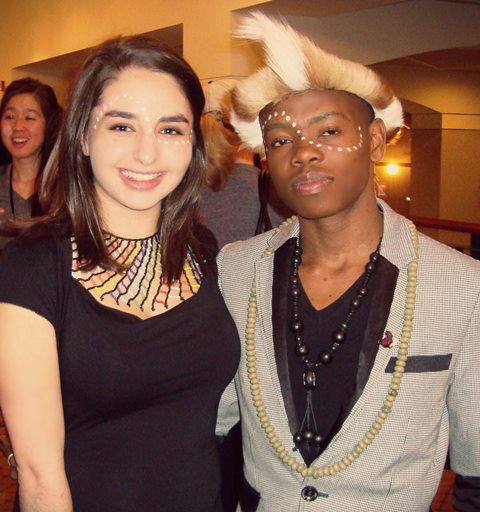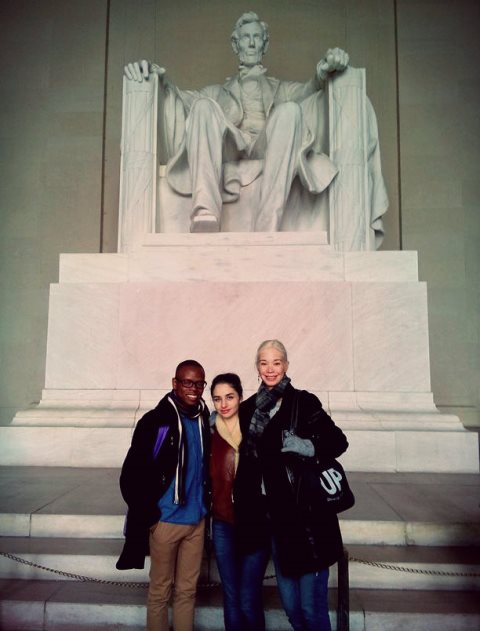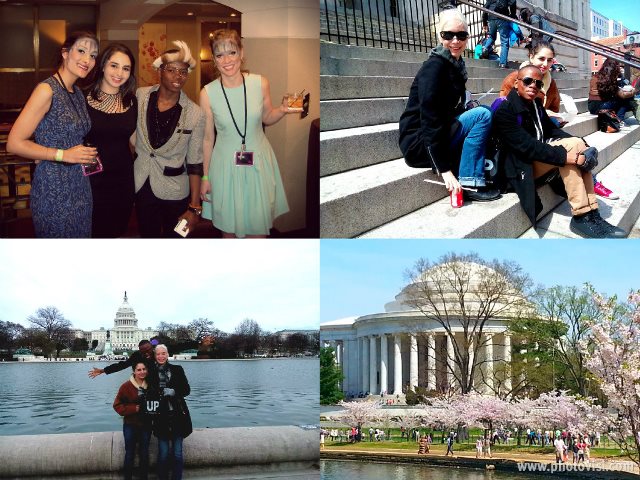Posted on May 19, 2014
The University of Pretoria is proud to announce that the 2014 Jessup Cup national champions (the team from TuksLaw who had won the national heats) was the highest-ranked African team at the 2014 International Philip C Jessup Cup Competition. This achievement shows that the University of Pretoria really is the ‘Global Faculty of Law in Africa’. We would like to congratulate the winning team from the University of Queensland and the runners-up from Singapore Management University.
More than 650 teams competed globally to advance to the international competition where 114 teams representing 83 countries competed for the Jessup Cup, the most sought-after international moot court competition cup. The TuksLaw team was ranked 34th out of the 114 competing university teams at the International Rounds held in Washington, DC in April this year. This is an exceptional achievement as the team competed against both under- and postgraduate students and larger contingents and missed out on proceeding to the quarter-finals by only two positions.
What is the Jessup Cup?
The Philip C Jessup International Law Moot Court Competition is the world's largest moot court competition and draws participants from over 650 law schools in more than 83 countries. In 2014 this competition was held for the 55th time and more than 123 jurisdictions were presented. The Competition is a simulation of an imaginary dispute between countries heard before the International Court of Justice, the judicial organ of the United Nations. One team from every eligible school is allowed to participate. Teams prepare oral and written pleadings, arguing for both the applicant and the respondent. Most students first compete in qualifying competitions (generally held from January to March) in their own countries or regions to earn the right to advance to the White & Case International Rounds held in Washington, DC every spring.
The 2014 Jessup moot problem
The 2014 Jessup problem incorporated areas of environmental law, cultural restitution and international criminal law, all of which were painted against the backdrop of the law of the sea.
The first prayer involved the construction of an artificial island by the respondent state, Ritania. The area of contention related to the obligation to prevent trans-boundary environmental harm and the extent to which a trans-boundary environmental impact assessment is mandatory under international law.
The second prayer involved sacred artefacts belonging to Ritania that had been stolen in 1520 by a pirate who flew the flag of the applicant state, Amalea. The status of cultural restitution under international law was brought into question and a place for such a remedy was considered in the context of a post-colonial international community.
The third and fourth prayers involved a collision between an Amalean warship and a private yacht that had been stolen by a Ritanian national. The first of these two prayers raised the possibility of developing the definition of hot pursuit to better accommodate modern international crimes. The prayer directed competitors to consider human trafficking and the possible conservative approach employed by international law in understanding the crime as a modern form of slavery.
By contrast, the final prayer questioned the long-standing principle of mala captus bene detentus. Participants considered the requisite link between the purpose of an arrest and subsequent detention while grappling with a possible hierarchy of jurisdiction purported by international law.
TuksLaw showed exceptional skill as the team argued for both the applicant and the respondent in the international rounds. According to the team’s coach, Martie Bradley from the Department of Public Law, this demonstrates the thoroughness of the students’ training in international law as students are taught how to analyse and apply the law in order to be able to represent either party involved in a court case. This requires in-depth research and inspires a more in-depth appreciation of the strengths and weaknesses of each case, which can be used advantageously in overcoming the difficulties in one’s own case.
TuksLaw – the 2014 South African (and African) champions
South Africa was represented by the national champions, the 2014 TuksLaw Jessup Team. The team, which consisted of Alexia Katsiginis (BCom III) and Keketso Gift Kgomosotho (LLB IV), was coached by Martie Bradley, an LLD student and academic associate in the Department of Public Law, and assistant coach Adu Gumede, a final-year LLB student from the Faculty of Law.
The TuksLaw's team’s road to Washington included winning all the categories of the National Round final, including Best Memorials and Best Oralist (Keketso Gift Kgomosotho). TuksLaw teams representing the Faculty of Law of the University of Pretoria have walked away with the laurels from the National Rounds for many years and progressed to the Final Rounds of the National Rounds of this competition for the past five years (2010 to 2014). They were victorious in four out of the five final rounds, each time eliminating their South African counterparts to represent their country at the international rounds. Universities that participated in the 2014 National Rounds were the Nelson Mandela Metropolitan University (NMMU), the University of Cape Town (UCT), the University of South Africa (Unisa) and the University of the Western Cape (UWC).
Coach Martie Bradley says that ‘competing in moot courts and international moot courts teaches students intricate research and writing skills. Since their arguments are tested by an international panel of judges, it teaches them confidence, court etiquette and exposure to verbal presentation at an international level. There is truth in the saying that moot courts are won in the library, as every legal aspect and authority has to be consulted to help you to give a correctly nuanced version of your case. The fact that both the applicant’s and the respondent’s sides have to be argued, gives students a very balanced view of research and the art of presenting the same case for opposing sides. A winning team must be able to write academically, research accurately and present orally, which results in the very rapid development of legal skills during such a competition.’
When asked to comment on the experience, Keketso Gift Kgomosotho said, ‘I thoroughly enjoyed the international Jessup rounds; it was truly an enriching experience for which I am thankful. I had the best coach and an awesome partner. I am very proud of our performance. We did exceptionally well.’
Talking about her experience at the international rounds, Alexia Katsiginis shared the following: ‘When I participated in my first moot, I was told that no mooter will complete a competition without wanting to give up. I suppose that in many ways this holds true. By its very nature the Jessup Competition is designed to test and challenge participants as orators, researchers and, most importantly, informed students. My inspiration in this competition was the support I received from my team and the countless academics who sacrificed their time to ensure that South Africa was well represented. However, above all the Jessup Competition developed my interest in international law and exposed me to both its flaws and good qualities, allowing me to imagine the possibility of lighting the dark side of international law.’
University of Pretoria has a proud Jessup history – the impact on our mooters of competing in the international rounds
The University of Pretoria has a long and rich history of representing South Africa and competing in the International Jessup Rounds. Former mooters include Prof Dire Tladi, Professor at UP, who served as the Legal Advisor of the South African Permanent Mission to New York and in the UN International Law Commission for five years. Another former mooter is Jonathan Swanepoel, a UP and Oxford graduate currently working in employed in the legal division of the International Monetary Fund in Washington.
There are many other successful TuksLaw mooters and alumni, such as Rhodes scholar Kgomotso Moshikaro, Gates Cambridge scholar Michael Dafel, to mention but a few.
‘My first contact with international law was not in the lecture hall; it was through participation in the moot courts – first the African Human Rights Moot Court Competition and then Jessup. I also had the privilege of coaching several moot court competition teams and accompanying one team (Lewis, Granova and Grové) to the International Rounds in Washington. It was the moot court competitions, especially Jessup, that first aroused my interest in international law. One could therefore say that the moot courts played a big role in making me who I am,’ says Prof Tladi.
Petronel Kruger states that she was honoured to represent the University of Pretoria in the 2012 Jessup Cup Competition. 'The challenge already manifested during trials for the competition, when the selection process demanded many additional hours of studying a foreign field of law and analysing a highly complex fact set of more than 40 pages. I made the mistake of reading about the competition on Wikipedia, where I learned that competitors had an ‘almost encyclopaedic knowledge’ of international law. Jitters and nerves aside, I applied the ABCs of success (‘Apply Butt to Chair’) and worked together with my co-counsel and coach to reign victorious at the South African National Rounds, from where I proceeded to represent my country in Washington, DC. The following year I coached the South African National Champions who also had the honour of displaying their skills in the capital of the United States (and this while the world-famous cherry blossoms were in full bloom). From the other side of the judging bench, the growth in the students was visible. I had the privilege of seeing my team gain the necessary confidence and knowledge to go head-to-head with and challenge big-name universities like Harvard and the London School of Economics.’ She further referred to her participation in Jessup as ‘a meteoric moment in my law career’. She said, ‘Very few, if any, experiences have pushed me that hard, but as a student in the Centre for Human Rights and Democratisation in Africa’s master’s programme – an award-winning, scholarship-based UNESCO postgraduate programme – I can see the benefits of participation in Jessup in my writing, analytical and time-management skills. I also believe that the moot is a good recruiting platform and asset when applying for scholarships and jobs.’
Assistant coach and former Jessup competitor Adu Gumede is of the opinion that ‘being part of this competition is a great opportunity for the participants and the support team behind them. It was an opportunity to learn not only about the content of international law, but also about being part of something [a project]. I learned about myself in terms of how to motivate and support fellow students, and how to read and test arguments in international law. This year the team did very well. We are very proud of their achievements. It is safe to say that [both team members] surpassed our expectations and confirmed our belief in the team’s talent and the veracity of the TuksLaw mooting experience and the surrounding international law culture.'
Head Coach Martie Bradley added that, owing to the high exchange rate, the costs attached to participation in international competitions are substantial and the 2014 team members are very grateful to the Management of the University of Pretoria, in particular Prof Cheryl de la Rey (Vice-Chancellor and Principal), Prof Tyrone Pretorius (Vice-Principal responsible for Teaching and Learning), Prof André Boraine (Dean of the Faculty of Law) and Prof Christof Heyns (Co-director of the Institute for International and Comparative Law in Africa in the Faculty of Law and United Nations Special Rapporteur on Extrajudicial, Summary or Arbitrary Executions) for their continued support of the TuksLaw mooting teams.





Click here for more information on the University of Pretoria’s mooting history.
Copyright © University of Pretoria 2025. All rights reserved.
Get Social With Us
Download the UP Mobile App